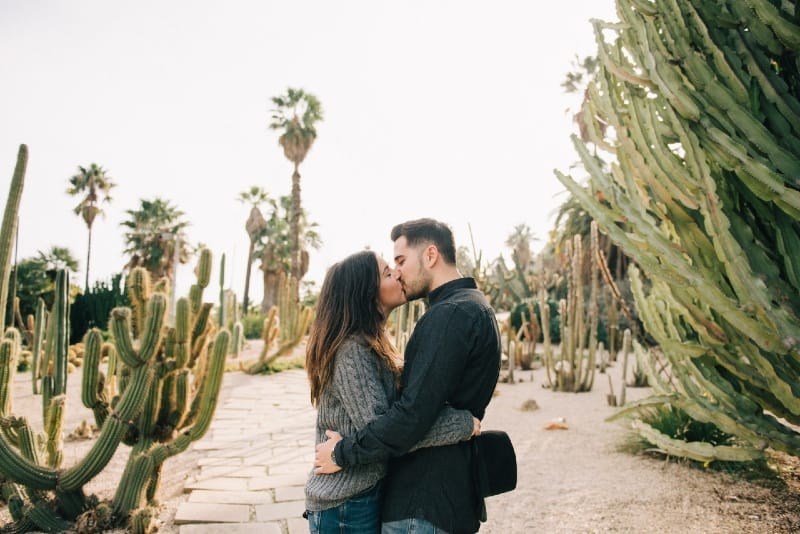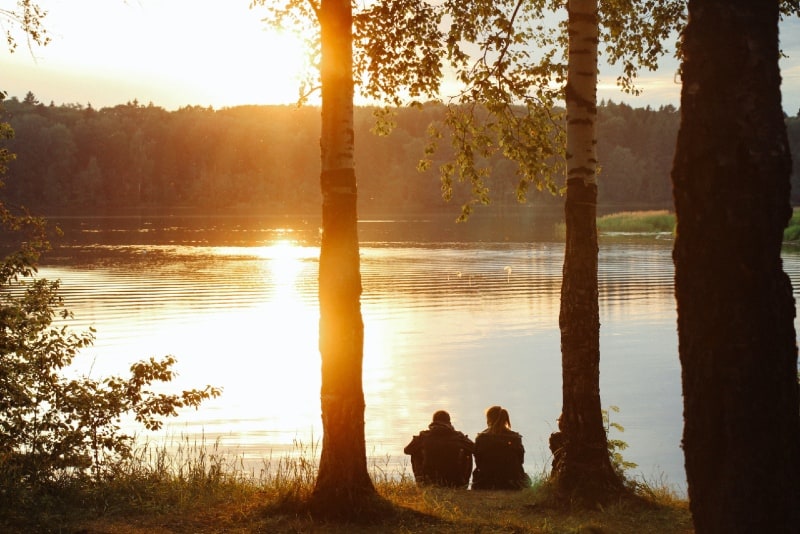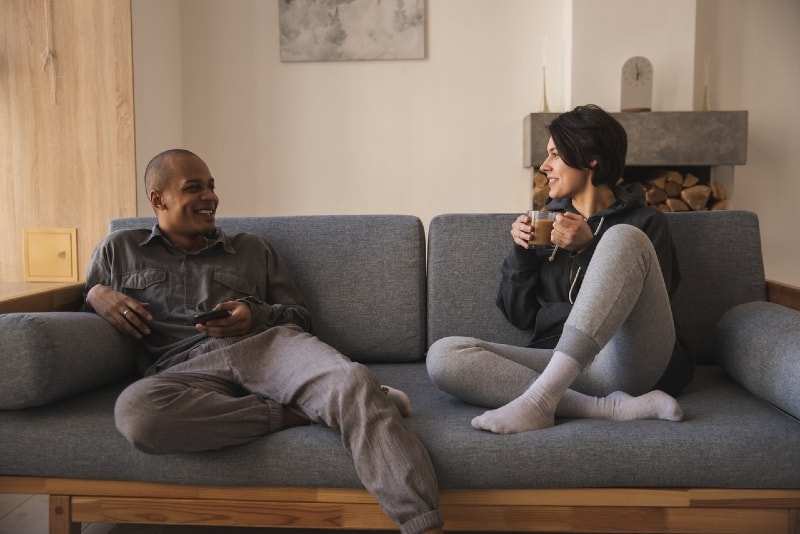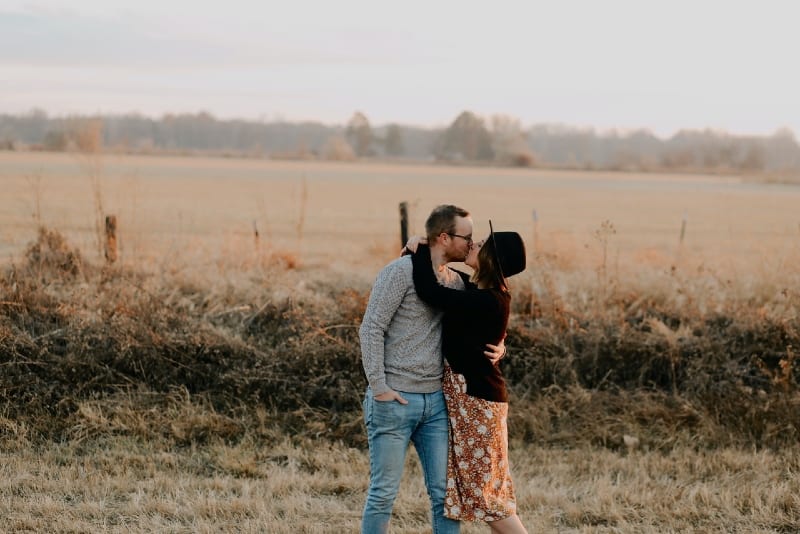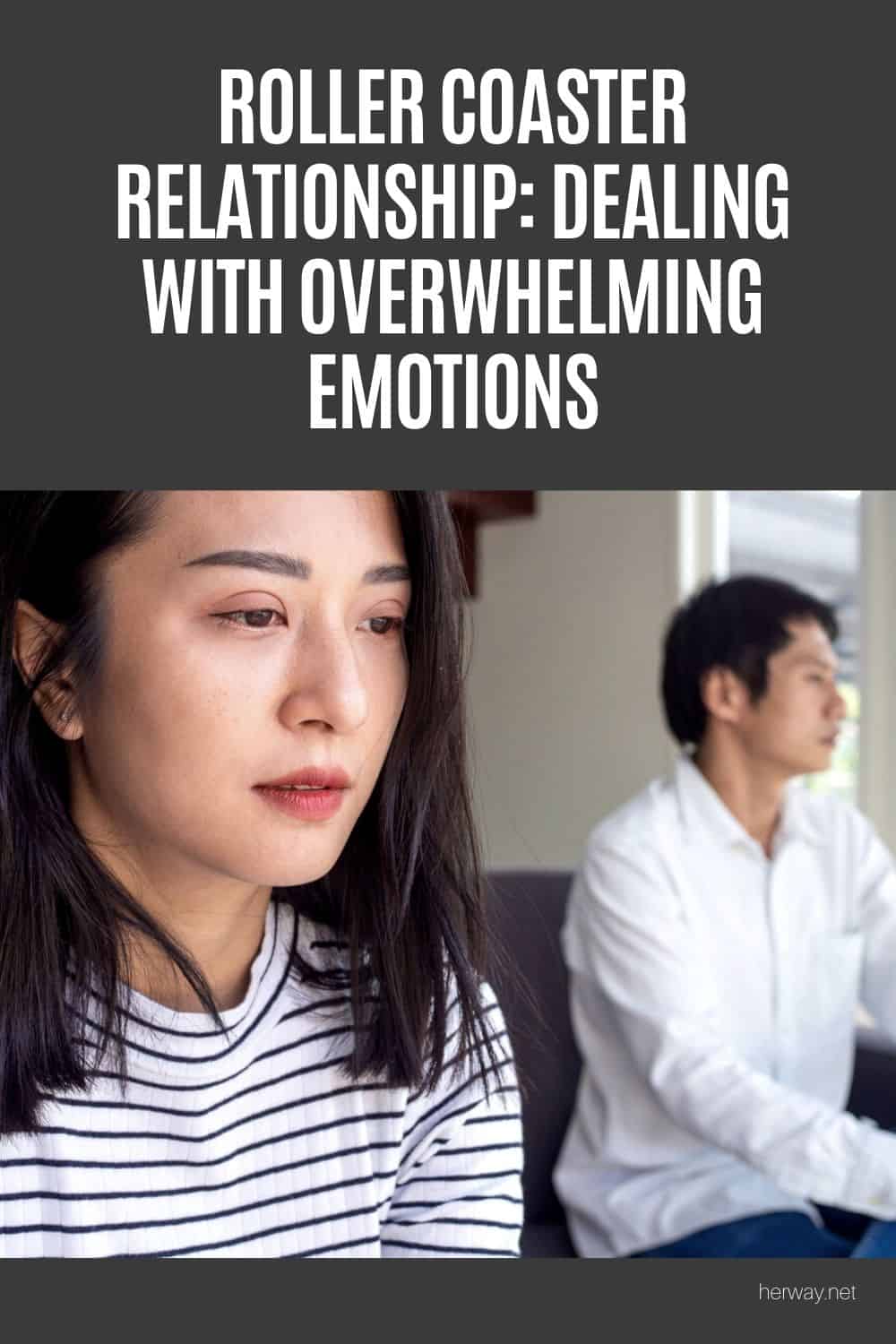A roller coaster relationship is one with constant emotional highs and lows.
It’s the type of relationship in which you can’t predict what’s going to happen next. You can’t predict the swings between highs full of connection and lows of disconnection.
It’s like a roller coaster, but not nearly as fun as you remember it as a child.
How does this kind of relationship happen?
A relationship like this happens because partners find it difficult to express and learn how to control their emotions. They get easily upset and experience different moods interchangeably.
The problem is not necessarily in expressing emotion, but the way they do it. When they’re upset, they don’t hold themselves back. Every emotion is heightened, which creates drama.
Dramatic is probably how most people would describe the relationship.
The reason for this behavior can be a lot of things.
Sometimes it’s because of the way a person grew up – for example, an unstable parental relationship, which a person continues to mimic later on in life.
Why does that happen?
Family is our first interaction with people. It’s our first model of a relationship. Naturally, that’s how we continue to see other relationships in our life.
If we grew up thinking that fights are a normal and everyday thing, it’s no surprise that we will imitate that behavior for lack of knowing anything else.
How can a child know a different way of communicating if they never experienced one?
Not only that, but why should it be weird when that same child repeats similar behavior? All of us long for familiarity, even when it’s something bad.
We’re attracted to what’s similar to our experience. It’s a subconscious thing.
That’s why destructive behavior creates more destructive behavior, and healthy relationships give rise to healthy relationships.
What can be done to escape the same scenario over and over again?
The best thing a person can do is to make his or her patterns of behavior and thoughts conscious.
When the root of the problem is made conscious, we have the power to change it.
It’s not easy because humans have an addictive nature, but it’s one hundred percent possible.
What do I mean by saying addictive nature?
We love routines. We love feeling safe and knowing exactly what’s coming next. Not only that, but our body keeps us repeating the same behavior: Did you know that humans can literally become addicted to stress?
Releasing our fight or flight hormone (cortisol) can become addictive, just like anything else.
Constant ups and downs are addictive too. The thing is, if we don’t break the cycle, we can’t have a normal relationship.
In order to have a healthy relationship, we have to have a strong trust and emotional connection with our partner.
If we don’t have these, uncertainty is what will kill the relationship in the end.
One of the most common problems in emotional rollercoaster relationships is the fact that neither of the partners knows if the other person loves or doesn’t love them.
That doesn’t have to be anybody’s fault. Maybe it’s just the case of different love languages.
Okay, but what does that mean?
If you constantly misunderstand your partner yet neither of you has bad intentions – maybe you express love differently.
For example, your partner appreciates affectionate words more than receiving gifts, while you appreciate it when it’s the other way around.
There are five main types of love language and they include words of affirmation, quality time, receiving gifts, acts of service, and physical touch.
It’s very useful to recognize one’s partner’s preferred love language and communicate it to them.
Other than this, in psychology, there’s the theory of attachment that can be applied to adult relationships.
Different attachment styles say a lot about a person and the way he or she acts in a relationship.
The four types of attachment include secure, anxious-preoccupied, dismissive-avoidant, and fearful-avoidant.
A secure attachment style is one with a positive view of self and others. For people with a secure style, it’s relatively easy to connect with others and form stable relationships. That’s an ideal type of relationship.
Anxious-preoccupied style seeks high levels of intimacy and approval, but the individual becomes overly dependent on the attachment figure.
A dismissive-avoidant style involves a need for a high level of independence that to others looks like an attempt to avoid attachment, which causes problems.
A fearful-avoidant type is characterized by wanting to get close to others but having a hard time trusting others, which is often a result of previous trauma.
Every community, including partnerships (especially romantic relationships), is based on mutual support. That’s exactly what we need.
The roller coaster ride just prolongs having our needs unmet instead of fulfilling them through supportive behavior.
Relationship dynamics tell a lot about our mental health. As already mentioned, the rollercoaster of emotions means uncertainty.
And uncertainty means doubt, lack of security, lack of self-esteem, and feelings of loss.
That kind of mental environment creates a problem with mental issues and perpetuates negative emotions.
Stable relationships go through different emotional states but they’re not that frequent.
Yet even when they do happen, the key is to solve the existing problem and not to blame each other like in most unstable relationships.
Trust and commitment are what’s essential for a relationship to work out.
Commitment means actively working on relationships and making an effort to keep it healthy and balanced.
How does the roller coaster relationship affect you?
This kind of relationship requires a lot of energy. That means there’s not enough energy for other things in life.
A relationship should be a safe place that allows us to do everything else in life with more ease, but in this case, it’s what makes everything else even more complicated.
Switching between happy and sad states results in frustration and exhaustion. In some cases, it consumes people so much, they have no life other than relationship problems.
Love life is a big part of life, but it shouldn’t be the only one. Everybody needs time for their own personal interests, friends, family, and job.
Unfortunately, lots of times people mistake an unstable relationship for passion. This imagery has been even more popularized through pop culture.
There are so many examples of toxic relationships presented as a passion.
Lying, cheating, blaming, name-calling, manipulating – it all goes on under the radar.
As long as there is physical attraction, over-the-top gestures, and occasional cute lines, we’re ready to forget everything that’s bad.
That’s not how it works in real life. Real life is full of accommodating, adapting, and unpleasant situations that can’t be fixed with one line and a cut.
Every time we normalize this kind of behavior, we’re taking a step back.
No relationship should make us feel miserable and insecure.
We’re allowed to end a relationship that decreases the quality of our life and doesn’t let us grow.
However, sometimes, problematic relationships become habitual and it’s usually because of the exciting, passionate part of the relationship.
That doesn’t mean they’re not for the most part overwhelming.
How to handle it?
Not every roller coaster relationship is doomed.
Problems don’t mean there’s no love. Those highs aren’t fake, they’re just inconsistent.
Through committed understanding, it’s possible to attain a stable relationship.
Talking about problems and listening to a partner can achieve much. This includes being honest with yourself too.
By becoming more aware of repeating patterns, we’re less likely to continue doing them.
It’s important to never underestimate the power of dedication and strong will. Dedication combined with love can do wonders.
Implementing the following things in your life will greatly improve any (and especially an emotionally charged) relationship:
1. Patience
Emotionally charged relationships are full of situations when someone gets mad and throws a fit over some issue that maybe isn’t one at all.
It might get on your nerves, but rather than joining them in a useless tantrum, stay calm and ask the right question.
Don’t be defensive. If they refuse to talk, wait for when they’ve cooled down.
Patience is often overlooked yet an essential trait in relationships, especially a long term relationship.
Rather than proving something we want to communicate, it allows us to see what our partner wants to communicate, without judging.
2. Don’t compare
Don’t compare your relationship to other relationships. It’s easy to fall into that trap, especially in a world where social media dictates the rules.
Your relationship is unique and has a unique set of good things as well as challenges. Comparing isn’t going to do anything but leave you feeling bad and unfulfilled.
The truth is, everyone has problems – you can’t see them because they don’t publicly display their issues. Life isn’t glamorous, no matter how much everyone wants it to be. It just isn’t.
Every person has their own pace and that’s okay. Every relationship has its own pace too.
There’s no point in rushing things when there’s no real need other than to match something you’ve seen somewhere else.
3. Be open-minded
To truly understand someone, you need to understand their point of view. And to understand someone else’s point of view, you need to be open-minded – being open and receptive to new ideas, arguments, information.
Without this trait, we can’t really solve problems due to our lack of perspective and understanding of all contributing factors.
That’s why it’s important for a problematic relationship.
Being open-minded isn’t necessarily easy because it can lead to confusion, and facing something for the first time is always a challenge. However, it’s very beneficial for relationships and life in general.
4. Compromise
Compromise is something you can’t skip in a relationship – and you shouldn’t.
It’s just a reality of living with other people.
Compromise is generally understood as giving up something in order to reach understanding with another person. It’s mutual agreement on something.
That also means that we’re accepting something below our standards. That shouldn’t be the end of the world.
I’m not saying you should compromise your boundaries – because that would be abuse – but making a compromise in small, everyday situations is a normal and positive thing.
Compromise is a sign your relationship is more important to you than your own ego.
For an easier agreement, it’s good to take a step back and see if the current issue has long term consequences. If it doesn’t, it’s easier to make a decision.
The other thing is putting yourself in others’ shoes. Understand why your partner wants something so different from you. What are their motives and where do they come from?
5. Don’t let the relationship define you
Complicated relationships take up a lot of our time.
We forget about other things in life. For example, we stop showing up to events or hanging out with our friends or coworkers.
Sometimes this behavior is caused by controlling or insecure partners, and that’s when you need to cross the line.
If you always need to check with your partner before doing anything, you’re either too dependent or a victim.
Think about if you do only the things both, you and your partner are interested in and ignore everything else.
Do you ever take time to be on your own? If so, how does that make you feel? Does staying single scare you and why?
Putting too much pressure on relationships is a big reason why they often fail.
Of course, your closest relationship is the first place where you’ll come for support and love, but nobody is capable of being one hundred percent perfect all the time.
Don’t let your relationship define you because, in the end, you’re an individual with your own dreams, goals, and ambitions. There’s absolutely nothing wrong with pursuing them.
If your relationship doesn’t let you do it, then it’s the wrong one.
Don’t ignore the signs of a toxic relationship
Sometimes what we think is a rollercoaster relationship is actually a toxic relationship.
The first kind of relationship can evolve; it can change and grow.
A toxic relationship, on the other hand, is almost impossible to change and causes serious damage to a person’s life.
It’s when one partner seeks to have control over the other, and is mentally or physically abusive.
Signs of a toxic relationship include continuous disrespect, control issues, avoidance, feelings of entrapment, constant criticism, etc.
If you feel bad all the time, if you live in a constant feeling of fear and anxiety, chances are you’re in a toxic relationship.
If nothing ever gets solved, then there’s no point in trying to make the relationship work.
It doesn’t matter how much you love the person, staying in an unhealthy relationship won’t benefit either of you.
This is why you shouldn’t ignore the first time boundaries that are crossed, the first time you find someone has been lying to you or cheated on you.
Those things are major red flags.
In short, toxic relationships are harmful to your well-being. There’s no excuse for toxic behavior.
If you get nothing that contributes to your self-esteem and energy, it’s likely that you’re in a one-sided relationship.
And what to do when you realize you’re in a toxic relationship?
The harsh truth is, you can’t change your partner. But it’s also the truth that you can change yourself anytime you want.
Don’t feed the bad behavior, draw the line. That will probably cause a strong reaction from the abusive partner, but it needs to be done nonetheless
If there’s nothing that can be done, leave the relationship.
How to find an ideal partner?
Everyone has the idea of an ideal relationship. If you’re feeling dissatisfied in your relationship, if you’re unable to make it healthy and functional, maybe it’s time to move on.
This time think about what you want and don’t just blindly end up in yet another dysfunctional relationship.
Pay attention to what you truly admire in other people. Try to figure out what kind of relationship you want.
Spend time with the people you admire, be open to trying new things, and know your values.
Also, keep in mind that you can be happy and single, and that’s so much better than being miserable in a relationship.
Don’t forget that every relationship – romantic or non-romantic – is a lot of work. It’s never what you see in movies.
Real relationships are full of awkward moments, confusion, triggers, and misunderstanding – and that’s completely normal.
There’s no way we can learn and grow without difficulties. If there were no mistakes, we wouldn’t make progress in life.
Relationships are a great test for our maturity and personal growth. There’s no way you can fake something in a close relationship, that’s why they’re so dynamic.
We usually build our character based on things we want to become. However, many people are not willing to put in the extra work that’s needed to achieve that perfect image they long for.
Dedication, patience, and understanding are everything when it comes to relationships, and that’s exactly what’s often missing from roller coaster relationships.
Without these things, all we do is create yet another superficial relationship full of frustrations and feelings of hurt, anger, and shame.
Put your guard down and have a heart-to-heart conversation with the person you love. Talk about your biggest goals and values in life. Remind yourself what brought you together in the first place.
After you pinpoint the meaning, start talking about the everyday things you can change in order to achieve that mutual goal.
Let each other breathe; allow each other to make mistakes, and then learn to do better.
“Life can be like a roller coaster with its ups and downs. What matters is whether you are keeping your eyes open or closed during the ride and who is next to you.” – Ana Ortega




